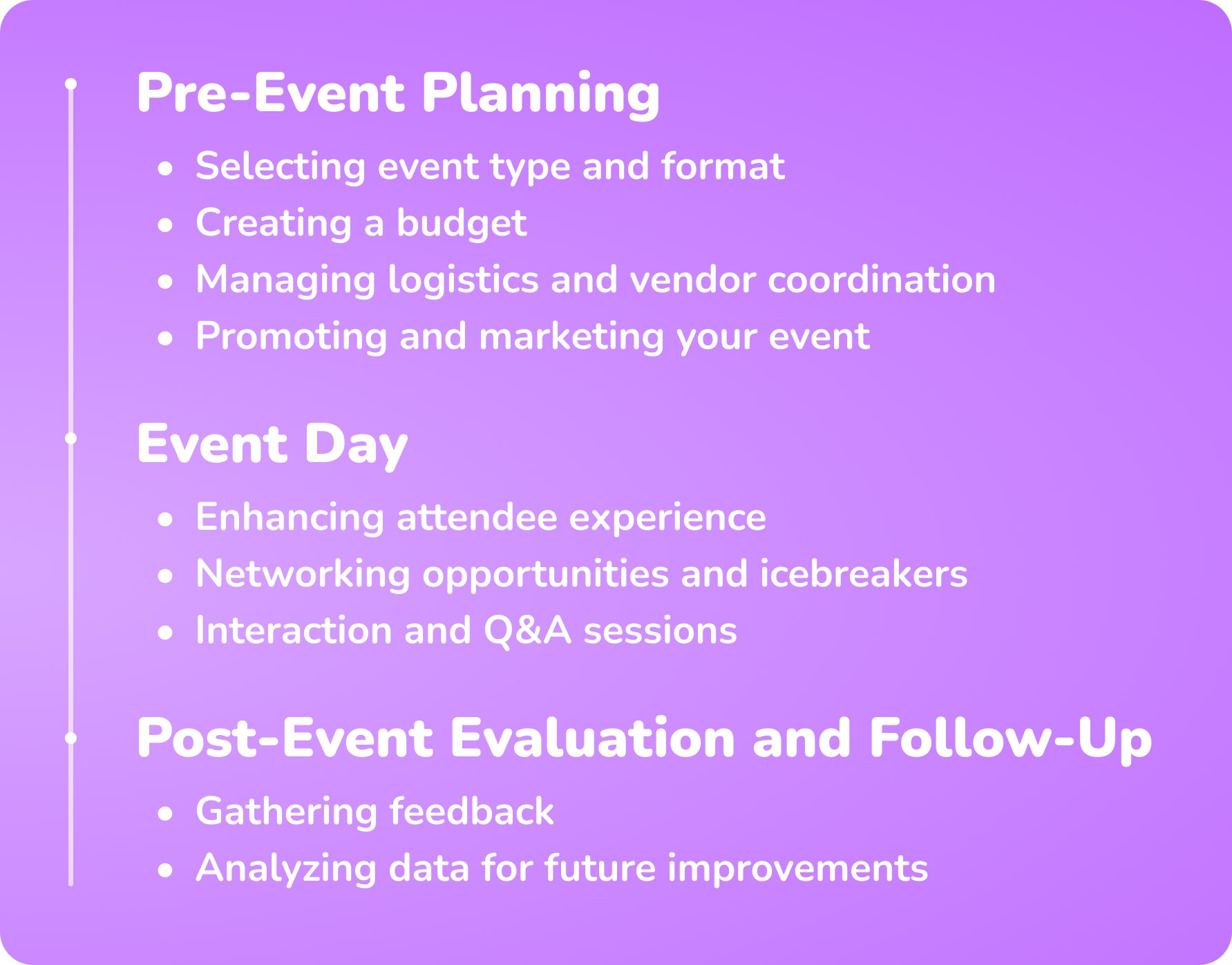Successful Corporate Event Planning: From Concept to Execution
Master the art of corporate event planning with expert tips and strategies. From concept to execution, create impactful gatherings for business success.

Corporate event planning can be a lot of fun, but it's not easy. This article walks through the corporate event planning process to ensure you have a successful corporate event.
The importance of effective event planning 📋
Planning a corporate event starts with defining your goals. What are you hoping to get out of the event? Once you understand your objectives, you can narrow down a list of suitable activities.
There are a few key elements for corporate event planners to be aware of. You'll want to set a budget for your event and stick with it. You should also establish a few metrics to review your event's success.
If you're planning a major corporate event, you'll probably need some help. Selecting a few team members to help organize events is a good idea. Other factors, like advertising and content creation, can also impact the planning process.

The pre-event planning phase 🗓️
All corporate events start with a pre-event planning phase. This is when you outline your primary goals for your event.
Conducting a needs assessment and audience analysis ✏️
A needs assessment and audience analysis help you understand who is likely to attend and why. In your needs assessment, you'll consider what you are hoping to achieve with your event, as well as which people are likely to attend and what they'll gain from being there.
For instance, if you plan a virtual happy hour with remote workers, you likely hope to improve team relationships. You might want to see more collaboration between your employees.
To make the most of your event, it's a good idea to schedule it when everyone's available. You might also send your team snacks and drinks, so they don't need to pay for them themselves.
Selecting the appropriate event type and format ☝️
Once you understand why you're planning an event, it's time to choose the event format and activity that will yield the best results. There are thousands of options available. Feel free to think creatively and find an activity that attendees will remember.
While tried and true activities will deliver results, they may be uninspiring. Instead of a simple lunch or training activity, liven it up a little by including a game your team will enjoy, like speed networking or trivia.
Creating a comprehensive event budget 💸
The costs for your event can range from less than $100 to thousands. Set a budget to ensure you don't spend more than your company can afford.
Your budget should include every expense you'll incur for the event. Some typical event costs are:
- Food and beverages
- Rental expenses
- Advertising and promotion
- Labor costs
- Audio and visual equipment
- Speakers
- Materials and decor
To understand what you'll pay for each line in your budget, research costs in your area. Obtaining quotes from different vendors can also help.
Establishing a realistic timeline and milestones 🏃♀️
Some events don't require much effort to set up. For instance, if you're organizing a department happy hour, you just need to pick a date when everyone's free. If only a handful of people are attending, you won't need to book in advance. Your team can show up at the designated spot.
Complex events require more effort. If you plan to promote your business at an industry conference, you'll want to set up a timeline and establish milestones. A timeline helps ensure that you follow a planning process when preparing for your event.
Building a competent event planning team 👨👩👧
It's not a good idea to handle major corporate event planning by yourself. Instead, select people to help you to keep from getting overwhelmed.
If your event needs some advertising, reach out to your marketing team. They can help design promotional materials. Similarly, administrative assistants can help you with vendor research, and your accounting team might assist with overseeing the budget.
Platform and tools 🔧
If planning large-scale events, consider investing in a platform to help.
Identifying the ideal virtual platform for corporate event planning 💻
Confetti offers many virtual event options. You'll find all kinds of team-building events, including trivia, wine tasting, and stress management workshops. Everyone can join through our platform, no matter where the are. And you won’t need to worry about sourcing vendors or creating custom invites. We make everything super simple for you.

Managing event logistics and vendor coordination 🚛
Ensuring your event goes off without a hitch requires some coordination. You may be working with multiple vendors, so you'll want to make sure they're available when needed.
It's important to schedule vendors at the right time. You might schedule the setup a day in advance. That way, the decor will be ready for your attendees. You'll also want to time food to arrive just before breaks so it's fresh and ready to eat.
Ensuring accessibility and accommodations 🧏
If some of your attendees need accommodations, you should make those available. For instance, if one of your participants is deaf, a sign language interpreter can ensure they don't miss anything. You'll also want to be aware of any mobility challenges.
Virtual and hybrid events require special consideration. Think about including closed captioning for training and discussions. These measures ensure that people who are hard of hearing don't miss anything.
Engaging content creation 🖼️
To get the most out of your event, your content must be interesting.
Crafting a compelling event theme and message 🪄
All events should have a theme and message that tell people what your event is about. For example, suppose that you're holding an event on the environment. You could tell people they'll learn about recycling and composting. Attendees who sign up will know you plan to discuss the benefits of sustainable waste management.
Selecting relevant speakers and entertainment 🧑🏫
Educational events require a speaker. That person will act as a teacher and explain your content in-depth. Hiring or selecting a qualified speaker is essential if you have a complex topic.
For events that involve entertainment, pick someone who knows how to work a crowd. A good public speaker who regularly performs at corporate events is another good option.
Incorporating interactive workshops and activities 🤸♀️
The more interactive your event is, the more likely people are to enjoy it. After all, no one wants to sit for hours while someone talks about dull topics. If your event is educational and likely to be a bit information-heavy, consider including a few games to keep people focused.
Activities keep people energized during events. It's also a good idea to schedule breaks every hour and offer some opportunities for socializing. That way, people can build connections during your event.
Event promotion and marketing strategies 📢
You'll have difficulty attracting attendees if you don't promote your event. Here are a few event marketing strategies to consider.
Creating hype for your digital event 👏
Do you have a digital event planned? If so, share it on social media, through email, and on your website. You may even consider making a temporary event website. Make sure all of your clients and employees are aware of it.
You'll want to highlight any special features of your event. For instance, if a public figure is speaking, announce it online.
Boosting attendance with email campaigns and personalized invitations 📧
People like to feel special and unique. To increase the number of participants, create personalized invitations for the individuals you want to attend. Personalization can be as simple as using their name in your email. You can also segment your invitations according to your audience's interests.
Collaborating with industry influencers and partners 🤝
Working with an influencer is a great way to inform people of your event. Influencers often have large followings, and people pay attention to their recommendations.
If multiple companies participate in the event, consider partnering with them for promotional purposes. Everyone can share the news with their audience and advertise who will be there. You'll benefit from the partnership without having to pay extra for advertising.
Measuring and tracking marketing efforts 📉
Make sure to monitor your marketing efforts to ensure they're productive. To do that, you can set up a few metrics to evaluate. If you share the event through social media, see how many clicks your sign-up page gets. You'll also want to monitor the comments and messages you receive.
Attendee engagement and experience ✨

When the big event day arrives, it's time to ensure everyone has a fantastic time.
Enhancing attendee experience from registration to conclusion 😀
Large-scale events can involve thousands of people. If you're holding one, you'll want to streamline the entrance process so people don't spend hours in line. Online registration can save you (and your attendees) lots of time.
Providing your participants with an app that includes the event schedule is also helpful. They can follow the schedule as they move between activities.
Facilitating networking opportunities and ice-breakers 🧊
You'll want to include a few networking opportunities during your event. Some ideas include:
- Company-provided meals
- Games and trivia
- After-event happy hours
- Fitness activities, like Zumba or yoga
Networking allows attendees to form connections with new people.
Encouraging interaction and Q&A sessions ❔
Your attendees will likely have inquiries after a presentation. Give everyone a chance to ask the speaker questions. If the event is fairly long, break it up into multiple sessions, each with its own Q&A period.
Gathering feedback and post-event surveys 📝
Feedback is an integral part of the event planning process. You want to know what people liked and disliked about the event so you can make improvements for next time. Ask attendees to fill out a short survey at the end of the event. You can also share it via email, so they can complete it on their own time.
Post-event evaluation and follow-up 👀
After an event, you'll want to keep up the momentum.
Sharing your successful event on social media 📱
Not everyone you invite will be able to attend. Show them what they missed by posting photos on your social media accounts. To add some extra credibility to your posts, you can ask participants for permission to post their comments and photos on your social media accounts.
Assessing event success and achievement of objectives 🎉
During the event planning process, you set goals for your event. Now is the time to see if you achieved them. For instance, if your goal was to improve employee engagement, survey how people feel about the workplace. Compare the results to your benchmark. If they've improved, your event was successful.
Gathering feedback from attendees, speakers, and staff 👂
You'll want to ask everyone involved in the event about their experience. Include speakers and staff to learn where you might make enhancements. Of course, you'll want to give attendees a chance to express their feelings about the event, too. The more feedback you receive, the better.
Analyzing data and metrics for future improvements 📊
Sit down with the data from your event and consider where you might make improvements. Did people dislike the food you provided? Were the seats uncomfortable? Was the speaker boring? Use that data for future events. For example, if people didn't like the food, choose another caterer next time.
Sending thank-you notes and follow-up communications ✉️
It's a good idea to thank everyone involved in the event. If they know you appreciate their participation, they'll be more likely to join again. Try to personalize your thank-you notes if possible. That way, people know you're genuine.
With the right strategy, your next event will be a success 🎉
Corporate event planning isn't easy. But with this corporate event planning checklist and the right strategy, you can put on an event that no one will ever forget. Break the planning process into steps and ask for help if needed. And remember to ask for feedback after your event to learn where you can improve in the future.
Do you need help planning a successful corporate event for business growth? Get help from Confetti's event experts.
Why Choose Confetti?









More on Corporate Events
The Ultimate Guide to Corporate Events: From In-Person to Virtual
Unlock the full potential of corporate events, and discover expert tips for planning impactful in-person, virtual, and hybrid gatherings.
Unforgettable Corporate Event Ideas: Sparking the Fun and Creativity in Team Building
Discover unique corporate event ideas that foster fun, creativity, and strong team building. Make your next event truly unforgettable!
Frequently Asked Questions
What is a corporate event planner?
A corporate event planner specializes in overseeing business events. They plan the event from beginning to end.
How do you plan a successful corporate event?
Start by defining your objectives. Then, you can decide on the appropriate format for your event.
What are the challenges of corporate event planning?
One main challenge of corporate event planning is audience engagement. You'll want to keep the participants interested. Otherwise, they won't enjoy your event.









